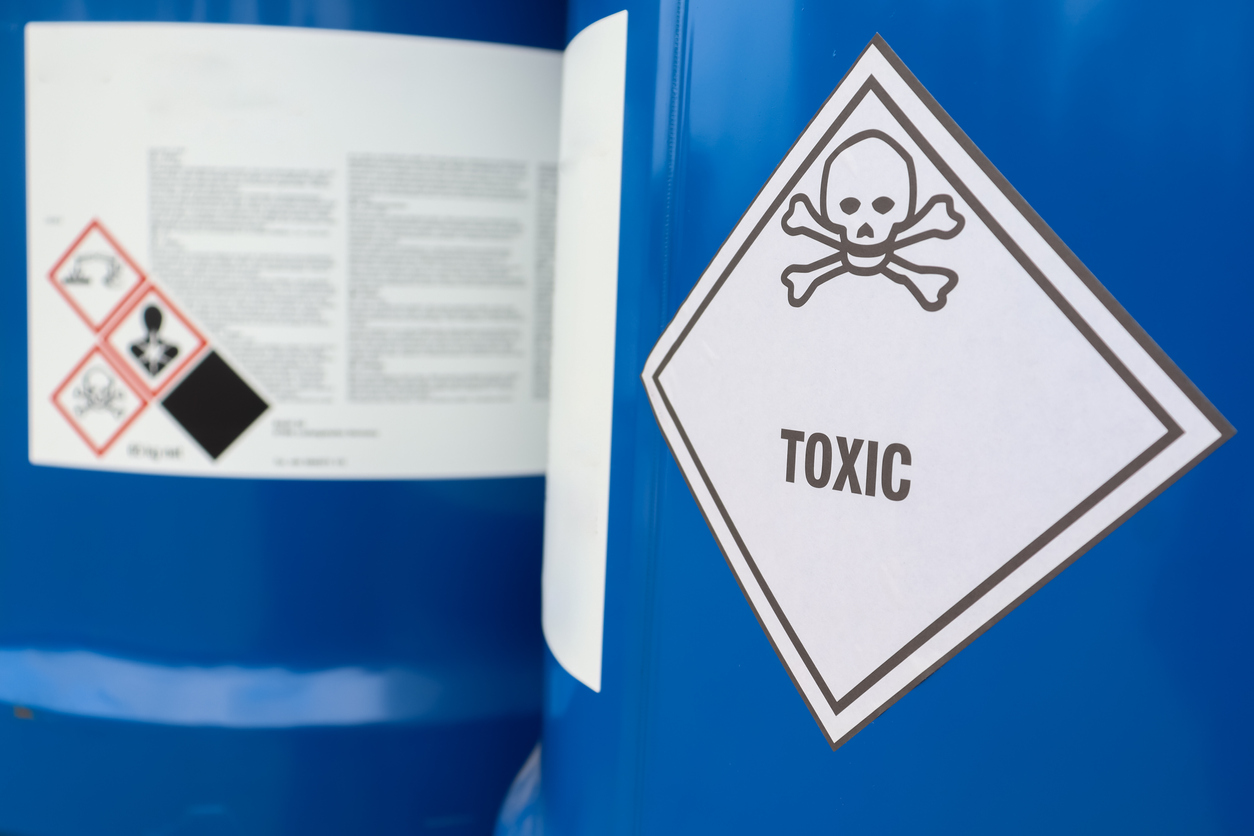Episode 44: Calloway County injury attorney Jeff Roberts discusses workers’ compensation for a chemical injury. This is also referred to toxic exposure. Jeff also maintains an office in Christian County to better serve clients in that area of Western Kentucky.
Western Kentucky is a region with multiple chemical plants and other plants using a variety of chemicals. Each could pose a threat should a chemical leak, spill or explosion occur. We’ll discuss chemical injuries ranging from contact with the skin, to chemical inhalation and respiratory problems, to chemical-related death. These injuries often lead to the worker filing a Kentucky worker’s compensation claim, and in some situations, others may be able to file a personal injury claim, resulting from damages related to chemical injuries.
Some chemical leaks can be airborne, while others could involve a fluid. It’s possible for a toxic fluid to seep into the ground and come into contact with our ground water. Those types of situations may cause injuries many years down the road, such as the Camp Lejeune water contamination that’s been in the news, lately.

Dangerous Chemical Contact to the Skin
A common chemical injury due to accidental contact with the skin is a chemical burn. A plant or facility is supposed to have safety equipment, such as an eyewash station, near the chemicals. In the event there is an emergency, but the safety equipment is either unavailable or inoperable, the employer could be sued for violations of safety policies and procedures or other OSHA-related regulations. In this situation, the value of the workers’ compensation claim could be increased. This is commonly known as the “safety penalty.”
If a vendor or other non-employee is injured as a result of the chemical leak (either as an airborne or fluid) the company could be held liable for additional negligence claims by those injured as a result. This would be handled in civil court as a personal injury claim. Again, the employees would have to file a workers’ comp claim.
Jeff describes a case he once handled for a client injured in a chemical burn situation. The line was supposed to have been drained, but when the worker began to remove the valve, the pressure in the line sprayed the worker with a harmful chemical. These types of accidents could put a worker at risk for chemical burns, but also organ-related injuries if the chemical were to be accidentally ingested. Toxic exposure cases can be tragic, and ultimately fatal.
Long-term Effects of Toxic Exposure
Jeff explains that reopening a claim can be difficult. For instance, if a worker were to suffer an exposure and subsequently develops cancer years down the road, related to that exposure, it’s going to take some time to prove the relationship between the exposure and the onset of the disease.
Under current Kentucky workers’ compensation laws, the medical treatment may be covered for an extended period of time. There may be a potential chance to pursue benefits for new injuries. Chemical exposure over a long period of time, such as heavy metal exposure, can lead to lung cancer or other types of cancer. These are difficult cases to prove, but it can be done, such as in the case of asbestos-related exposure.
There may also be a potential to bring a claim against the manufacturer of the chemical. Asbestos manufacturers and other toxic chemicals manufacturers may liable for not disclosing the risks to workers. For instance, we’ve recently seen cases for exposure to Roundup.
Injuries from Inhaling Chemical Fumes
A Chemical injury from a toxic cloud could cause severe respiratory injuries, scarring and in some cases, death. Similar to other types of Kentucky workers’ compensation claims, the injured worker still has to establish the work caused the damage. An impairment rating will be assigned by a doctor. This will detail either the work-restrictions, the qualification for permanent disability or possibly total disability.
In the case of a current smoker, it may be possible for the workers’ compensation insurance adjuster to try to claim the smoking caused the problem and not the exposure. Again, this is why seeking out the services of an experienced, Kentucky workers’ compensation attorney is extremely important to maximizing the value of your chemical exposure claim.
Chemical Exposure Fatalities
Unfortunately, there are situations in which a worker dies due to chemical exposure or occupational disease. Certain survivors are entitled to receive survivor’s benefits, under the KY workers’ comp system. A surviving spouse would receive 50% of the benefits, subject to limitations. Minor children would also receive survivor’s benefits up to age 18 or age 22, if they are enrolled in an accredited educational facility. A dependent adult child could also be eligible to receive these benefits. Others, such as an adult parent, who was dependent upon the injured worker, may also be eligible for benefits. Some families are unaware of the the survivor’s benefits involved in a workers’ compensation for a chemical injury.
If the death occurs within 4 years of the disease, or within 4 years of contracting the occupational disease, the estate would receive a lump sum payment. Jeff explains that as of 2022, that payment is approximately $95,000.
Jeff Roberts recorded a previous episode on Kentucky Workplace Fatalities. Click that link to listen to the episode.
Chemical Injury to Non-Employees
Non-employees can be impacted by a chemical leak in a number of ways. If there is a toxic, chemical plume in the air, it could easily cause respiratory and even fatal results to those living and/or working around the leak. A chemical spill could potentially leak into other areas causing damage to the soil and even ground water. Finally, in extreme cases, an explosion could cause damage, injuries and even death to non-employees near the site of the chemical explosion.
The non-employee claims would be handle in circuit court as a personal injury claim involving negligence. The employer is can also be held responsible for the negligent actions of an employee. In this type of civil proceeding, the plaintiff could pursue a claim for pain and suffering. If a death is involved, there may also be a claim for loss of consortium, either by the spouse or the minor children. Non-employees would not be covered under Kentucky workers’ comp. Pain and suffering is not an available claim under our workers’ compensation laws.
Jeff Roberts handles Kentucky workers’ compensation claims, personal injury claims and social security disability claims, all of which could be involved in a chemical leak situation.
Jeff Roberts Represents Injured Clients Throughout Kentucky
With offices located in Calloway County and now Christian County, Jeff has a history of representing personal injury clients, workers’ compensation clients and social security disability clients across the state. He’s represented clients from Paducah, Bowling Green, Louisville, Covington, Whitesville and many other Kentucky locations. He’s not just a Western Kentucky injury attorney.
We hope you found this episode insightful and helpful. Thank you for listening!
Is It Time to Speak with an Attorney about Your Chemical Injury Claim?
The office phone number is (270) 753-0053 or toll free at 800-844-5108. For more information, visit www.JeffRobertsLaw.com. This podcast is meant to provide information and is not legal advice. Jeff’s principal office is located at 509 Main Street, Murray, Kentucky. Co-host Jim Ray is a non-attorney spokesperson. This is an advertisement.




